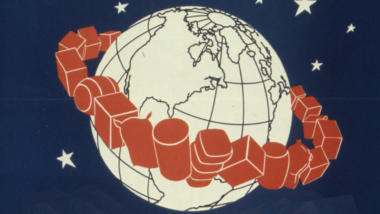Some of the world’s largest tech companies have lobbied the European Union behind closed doors to keep global data flows as unrestricted as possible.
Firms such as Microsoft, Google, Facebook and tech-industry groups have spoken to European Commission officials at least 16 times over the past two years to discuss negotiations between members of the World Trade Organisation (WTO) for a treaty on e-Commerce.
Minutes from meetings between Big Tech and EU officials obtained by netzpolitik.org offer a rare insight into lobbying on the new trade rules, which could set a legal framework on international data flows for decades to come.
Trade agenda „reflects interest of major digital powers“
Since 2017, the United States, China and more than 70 other countries, representing over 90 per cent of world trade, have joined talks in Geneva to create binding rules on electronic commerce, data flows, software source code and encryption.
While the secretive talks so far have received little attention in the international press, negotiations have seen a clear division between industrial nations such as the United States, the EU and countries of the Global South including India and China.

Some topics on the negotiating agenda „reflect the interests of the major digital powers and their superstar firms which are reaping first-mover advantages“, said a recent report by the United Nations Conference on Trade and Development (UNCTAD).
Poorer nations are concerned over proposed rules in favour of unrestricted cross-border data flows. Alternatively, provisions for data localization and customs duties on cross-border data flows could provide a „significant data chip to negotiate fair terms with global digital platforms seeking to work on local data and in domestic economies“, the UNCTAD report notes.
While some economic justice campaigners hope that data localization could help to generate economic activity in the Global South, civil liberties groups warn that it could give authoritarian countries such as Turkey new surveillance powers.
These warnings have been echoed in public by tech giants like Facebook, whose CEO Mark Zuckerberg has warned of „a really bad future“ in which authoritarian governments could abuse data localization laws.
Critics note that data localisation laws currently discussed or already passed in Nigeria, India and South Africa find a controversial precursor in China’s Cyber Security Law enacted in 2016, which requires personal data gathered in China to be stored on Chinese territory and to only be transferred overseas following a security assessment.
Fair trade or a „really bad future“?
Possible abuse of data localization laws for surveillance is a real concern, says campaigner Sven Hilbig with the German development NGO Brot für die Welt. He says that demands for data localization rules should be linked to obligations for countries to guarantee fundamental rights and data protection.
Hilbig stresses that both India and South Africa are attempting to strengthen data protection laws in their bid for digital sovereignty. He insists that allowing developing countries to impose conditions on data flows is a chance not to be missed.
„This could allow countries of the Global South to be more than just suppliers of data, but build their own data resources and create a data-driven economy.“
The campaigner also says we should question terms such as „free data flows“. „From the perspective of our partner organisations from the global south, the data from Bangladesh, Kenya or Guatemala stored on Amazon or Google servers is anything but free.“
What is an „ambitious agenda“?
Even though the EU has already called to ban data localisation requirements in a written proposal to the WTO in April 2019, tech industry lobbyists have pushed for an even stronger commitment.
In early 2020, a Google representative told the Commission that the company stressed the importance of having rules on cross-border data flows and data localization and was „pleased with the ambitious agenda of the WTO e-commerce negotiations“.
Within the context of the negotiations, the word ambitious is understood as „a means to improve the domestic regulatory environment … including for cross-border data flows [and] a ban on localization requirements“, the UNCTAD report notes.
Therefore, an „ambitious“ treaty could create an international commitment against data localization laws.
The industry push for „ambitious provisions on data flows and data localization requirements“ was echoed in a July 2020 meeting with trade group DigitalEurope, whose membership includes most major tech firms, as well as in an earlier meeting with the software lobby group BSA, which represents tech giants such as Amazon, Microsoft, Oracle and IBM.
Curiously, Commission minutes from meetings with Google, IBM and the Information Technology Industry Council (ITI) on different dates in February 2020 all state the same lobby message word for word: „They also considered that industry could play a more active role in explaining the business case for an ambitious e-commerce framework.“
In a written reply, a spokesperson for the Commission told netzpolitik.org that the three stakeholders did not used identical words in the meeting, but that the reports were drafted by the same Commission representative, who used the same sentence „to summarise three different versions of the same idea“.
Big Tech wants transatlantic axis
Meanwhile, the European Services Forum (ESF), a lobby group with members such as Apple, Google, Huawei, Orange and Vodafone, has pushed for an „improvement on cross border data flows“ in the EU’s position. „Not only outgoing data flows but also data incoming to the EU should be covered“, the Commission was told in a December 2020 meeting.
Companies have asked the EU and the US to align on digital trade policy. Data flows should be put on the agenda of the EU-US Trade and Technology Council, a newly created transatlantic forum, an unnamed Facebook vice president told the Commission at a meeting in February. Microsoft „underlined the importance of the EU and the US working together“ at an earlier meeting.
And indeed, the EU and the US announced the Trade and Technology Council at a summit meeting in June. One of its stated goals is to „avoid new technical barriers to trade“.
While most lobbying on the e-commerce treaty was done by Big Tech companies, the Commission also registered a meeting on the issue with the European Federation of Pharmaceutical Industries and Associations (EFPIA). The group told EU officials that there was „significant commercial interest“ in cross-border transfer of patient data.
The documents show that tech companies want to use international trade law to freeze the status quo, says campaigner Sven Hilbig. „Digital giants use the call to ban data localization to stifle independent tech policy-making in other countries.“
EU set to fight „digital protectionism“
Data flows are not the only contentious issue on the agenda of the trade negotiations. Consumer rights groups have raised concerns over a proposed provision in a leaked draft of the treaty that would ban forced transfer of source code or algorithms.
The EU and industrial countries argue that such a provision is necessary because innovation depends on the development and use of proprietary software. It is „an important tool to fight the rising trend of digital protectionism“, the European Commission told German MEP Svenja Hahn.
But campaigners argue that an overly broad prohibition limits countries‘ right to regulate. It could, for instance, harm the EU’s ongoing efforts to create a legal framework for the use of Artificial Intelligence (AI), a study by German consumer federation vzbv argues.
Another point of contention in the e-Commerce negotiations is the proposal to make a WTO moratorium on customs duties on electronic transmissions permanent. The moratorium has been in place since 1998 and so far was always extended by member states. But countries such as India want to end the moratorium to „preserve flexibility“ in trade policy.
The outcome of e-commerce negotiations remains uncertain. While negotiators are pushing for „substantial progress by December this year“, key issues appear unresolved. Any advance, however, is likely to see a renewed lobbying push by the world’s largest tech companies.
Update on July 2nd, 2021: The comment by a Commission spokesperson in paragraph 21 was added after publication.





0 Ergänzungen
Dieser Artikel ist älter als ein Jahr, daher sind die Ergänzungen geschlossen.